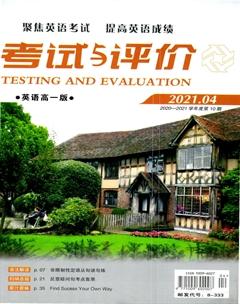将来进行时重点用法过关讲练
孙玉忠
将来进行时是一种借助连用将来时间状语兼具将来时和进行时特点的时态,它使所表述的内容更形象生动,一般表示离现在较近的将来。它的构成形式主要是:主语+情态动词(shall / will)+be doing。其具体用法根据使用情景主要有以下几种表达方式:
1. 将来进行时表示将来某一时刻某动作正在进行。如:
Dont worry, you wont miss her. She will be wearing a red T-shirt and a white skirt at that time. 别担心,你不会认不出她的。她到时会穿一件红色的T恤衫和一条白色的短裙。
This time tomorrow Ill be watching you play on TV. 明天这时候我将在电视上看你进行比赛。
2. 将来进行时常常用来表示将来的某件事是已经计划、安排好要发生的。如:
Doctor Wang will be giving another talk on this subject at the same time next week. 王博士下周同一时间将就这一课题再次做报告。
Well be seeing him tonight. 今晚我们要去见他。
3. 将来进行时可以用来表示可能性、原因和结果。如:
Its no use trying to see him at six this evening, because hell be giving a lesson then. 今晚6点去找他不行,他那时讲课。
If I fail to appear by 7 oclock, I will not be coming at all. 如果我7点钟不到,我就不会来。
4. 将来进行时可以用来客气地询问别人的打算或安排。如:
Will you be having dinner at home this evening? 你今天晚上要在家吃饭吗?
Will you be using the car tomorrow? If not, can I borrow it? 你明天要用汽车吗?不用的话,我可以借吗?
【拓展】 将来时的其他几种用法:
1. 一般将来时
表示将来某个时间要发生的动作或存在的状态,也表示将来经常或反复发生的动作,常用的时间状语有:tomorrow, soon, next week, some day, from now on, in (the) future, by the time, in three days等。如:
You shall fail if you dont work harder. 如果你不更加努力些,你会不及格的。
No one will leave the examination room before ten oclock. 十点以前谁也不能离开考场。
It is going to rain. Take an umbrella with you. 带一把伞去。看样子就要下雨了。
2. 将来完成时
将来完成时的构成是由“shall / will+have+过去分词”构成的。如:
When we get there, shell have gone to work. 我们到那里时她可能已经上班去了。
On Monday hell have been in Britain for three years. 到星期一,他在英國就呆满三年了。
3. 将来完成进行时
将来完成进行时用来表示某一动作一直延续到将来某一时刻。如:
By next week, he will have been staying here for ten years. 到下星期他将在这里住了10年了。
4. 过去将来时
过去将来时表示在过去看将要发生的动作或存在的状态,或将来打算做的事情。如:
We were excited, for the plane would carry us to Beijing soon. 我们很激动,因为飞机很快就会把我们带到北京。
If it should rain tomorrow, the sports meeting would be postponed. 要是明天下雨,运动会就延期举行。
【语法专练】
I. 单句语法填空。
1. By 10:00 tomorrow my lecture will have ended and I ___ (meet) my guests in my office.
2. I hope the roses ___ (come out) next time I see them.
3. —Youve left the light on.
—Oh, so I have. I ___ (go) and turn it off.
4. ___ (have) dinner at home at 6 oclock this evening?
5. Doctor Wang ___ (give) another talk on this subject at the same time next week.
6. —Could I use your car tomorrow morning?
—Sure. I ___ (write) a report at home.
7. I feel so excited! At this time tomorrow morning I ___ (fly) to Shanghai.
8. —Can I call you back at two oclock this afternoon?
—Im sorry, but by then I ___ (fly) to Beijing. How about five?
9. Daniels family ___ (enjoy) their holiday in Huangshan this time next week.
10. —Is it possible for us to meet at ten oclock tomorrow morning?
—Sorry, it is certainly not. I ___ (attend) an important meeting then.
II. 根据所给汉语完成句子,每空一词。
1. 八点以后别来电话——那时我正在参加会议。
Dont telephone me after eight—I ___ ___ ___(have) a meeting.
2. 你明天这时将做什么?
What ___ ___ ___ ___ this time tomorrow?
3. 明天上午你可以去找他,他那时正在家看电视。
You may go to see him tomorrow morning,
because he ___ ___ ___ ___ ___ ___.
4. 下個星期的这时候,我们将在那个工厂劳动。
This time next week ___ ___ ___ ___ ___ ___ ___.
III. 阅读下列句子,说出各个句子的时态。
1. Will you be using your bicycle this evening?
2. Next Friday we will go on our first field trip to study about our hometown.
3. Ill be meeting him sometime in the future.
4. How much do you want?
5. By this time tomorrow, Ill be lying on the beach.
6. At nine oclock tonight I will be doing my homework.
7. By four oclock, well have been practising for three hours.
8. We shall have learned 12 units by the end of this term.
9. No one will leave the examination room before ten oclock.
10. We were excited, for the plane would carry us to Beijing soon.
IV. 语法填空。
Hello, everyone! I am glad 1. ___ (give) a talk about the future life and study here. Thanks to the great development in science and technology, we are sure we 2.___ (live) a happier and more wonderful life in the future. Not only 3. ___ (be) provided with enough food and clothing, we 4. ___ also spend more time traveling around the world and enjoying other amusements. At that time, it 5.___ (make) our spare time more interesting and colorful. Furthermore, since we 6. ___ work more efficiently. We 7. ___ (have) less stress either from our study or from the work. However, our future life is not just full of amusement and joy, but also of challenge. Therefore, we 8. ___ work harder today, making preparations 9. ___ (make) more contributions to the development of the future society and the world. Only in this way can we adapt to the future life and enjoy ourselves when it 10. ___ (come).
Thats all. Thank you!
I believe in me more than anything in this world.
—Wilma Rudolph
在这世界上我最相信的是自己。
——威玛·鲁道夫
★ 威玛·鲁道夫(1940—1994)为美国第一位在同一奥运会获得三项金牌的女田径选手,在1960年代被誉为“the fastest woman on earth”(世界上最快的女人)。她年幼患得小儿麻痹,康复后足脚因长期戴支架而扭曲变形,直至12岁才如愿移除支架,并开始了她的运动生涯。她曾说过:“My doctor told me I would never walk again. My mother told me I would. I believed my mother.”(我的医生告诉我我永远无法再行走,我妈妈告诉我我可以,我相信我妈妈。)
You must expect great things of yourself before you can do them.
—Michael Jordan
你必须先见到很棒的自己,才能做出很棒的事。
——迈克尔·乔丹
★ 迈克尔·乔丹(1963—)被NBA官网称为史上最杰出的篮球运动员,曾率领芝加哥公牛队在1991、1992、1993年,及1996、1997、1998年,两度连续三年赢得NBA总冠军。

